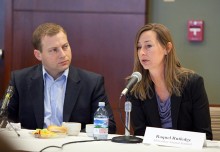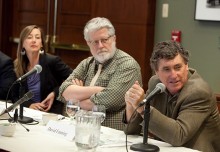
March 24, 2010 — The winner and five other finalists for the Goldsmith Prize for Investigative Reporting gathered this morning to share their personal stories of journalistic commitment and determination in the face of skepticism, obstruction and even intimidation.
The seminar, titled “The Present and Future of Investigative Reporting,” featured journalists from The Raleigh News & Observer, Houston’s KHOU-TV, The Boston Globe, The Milwaukee Journal Sentinel, The Washington Post, and ProPublica. Also present were David Fanning of Frontline, winner of the Goldsmith Career Award, and academic book prize winner Matthew Hindman.
- View the Slideshow
- Read the Awards Ceremony Transcript
- Read the Seminar Transcript
The night befpre, Raquel Rutledge of the Journal Sentinel won the prestigious Goldsmith reporting prize for “Cashing In on Kids,” a yearlong series of investigative stories that exposed millions of dollars of fraud in Wisconsin’s child-care system.
In discussing the current state of investigative journalism, Rutledge emphasized how easy it is for news tips to fall through the cracks and how something seemingly irrelevant can actually be a clue to a much larger, systemic problem. Indeed, her series of investigations began with a tip that a child who died after being left alone in a daycare van on a hot summer day should never have been there in the first place.
“It’s one of those things that easily could have fallen through the cracks at a lot of newspapers because if it went to the [crime] reporter, he would have been following up on the death,” she said. “But at the Milwaukee Journal Sentinel we had a system set up where I had been covering what we called ‘public investigator’ — consumer angle — news. So when that tip landed in my box, the first thing I thought was ‘If this is true, if this happens to be true, it’ll be huge’. So, it’s one of those things that could’ve fallen through the cracks but it didn’t.”

Richard Parker, lecturer in public policy and senior fellow of the Shorenstein Center, who moderated the discussion, lauded the efforts and work of investigative journalists: “I think of investigative journalism as the Hope Diamond of the jewelry collection that is journalism today, and that part of journalism that most needs to be protected as we go forward to a different financial period for the industry.”
This article is based on one written by Lindsay Hodges Anderson of Harvard Kennedy School Communications. The photos are by Martha Stewart. Read the entire article.

